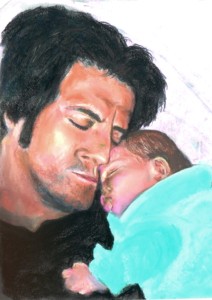Modern dads rock. Even without the hilarious 2010 You Tube Dad Life video detailing their many fine qualities, they have ample reason to add a notch to their belts every Father's Day.
I say this as a living artifact of 1970s parenthood, that transitional phase when being with a fully functioning co-parent meant (with any luck) seeing a budding dad "help" with the kids and magnanimously wait for the applause to die down. That took time, since any act of male parenting - like sitting next to the bathtub and flipping through a magazine while the children splashed in it - was grounds for all around cheers.
Back then, it was common and acceptable for a dad to be too queasy about soiled diapers to change them; to exit the room if a baby spit up and wait until the all-clear sounded; to not hear a baby cry in the night, since he "had to work" in the morning.
Even at that, the 1970s dad was a far more involved co-parent than previous generations, those who were not expected to help with childcare at all, so clear was the division of labor in American homes up to the 1960s. The traditional dad served as breadwinner and acted as if his wife's fulltime parenting - which paid nothing - was not work.
And who could blame a man for following in the footsteps of traditional fathers who, after a hard work week (and lawn/fix it duty), did no more than grab a beer and kick back in the recliner for the Saturday night fight or Sunday football game and holler to his wife to bring the pretzels and keep the kids quiet.
Still, old-fashioned dads gained our everlasting affection for taking us on outings to the softball field, fishing pier, woods, beach, circus, football stadium, and Thanksgiving Day parade; the later to let mother cook in peace.
Anyone can tell you, when the father of the house comes home, you can still hear a joyous, "Daddy!" from little kids (echoed by their relieved moms). The evolution observed to date includes for most families the induction of the co-provider, that female who works for pay outside the home and parents, even more, often carries the family's medical insurance. The one who now fights over the recliner and remote. (You can now hear a joyous, "Mommy!" from little kids (and their relieved dads) when she walks in the door.)
Even in the 1970s, it was becoming obvious one breadwinner was one too few. Back then, women could rightly balk at the physical impossibility of the Energizer bunny supermom model being touted in women's magazines. Looking around at typical family life, there seemed no way to be a supermom, super wife and super earner without an equally charged superdad, super husband and super earner.
I do not know how mothers and fathers do it today; the grueling schedules; the striving to keep their secure marriages, jobs and a roof over the family's head; the exhausting array of shared household tasks. They are super.
Though I admire mothers who parent with aplomb, I marvel when I see fathers tenderly placing babies into supermarket cart seats and tooling around the aisles, confidently selecting the formula, baby food, disposable diapers, diaper rash ointment - as if it is no big deal. Their wives are engaged in the career rat race, working late and often still solo commandeering the myriad details of their children's lives - annual physicals to school concerts to sports events and play dates.
There's something to be said about how both parents achieve strong bonds with their children and each other by such a high degree of parental involvement and true partnership. Today's families deserve society's support and the acknowledgement through governmental, educational, business and corporate policies that parents and children matter all the time and need their time together, even when they aren't making a dime. See the new book: How Our Work-First Culture Fails Dads, Families, and Businesses – And How We Can Fix It Together
Happy Father's Day! Dad Life
